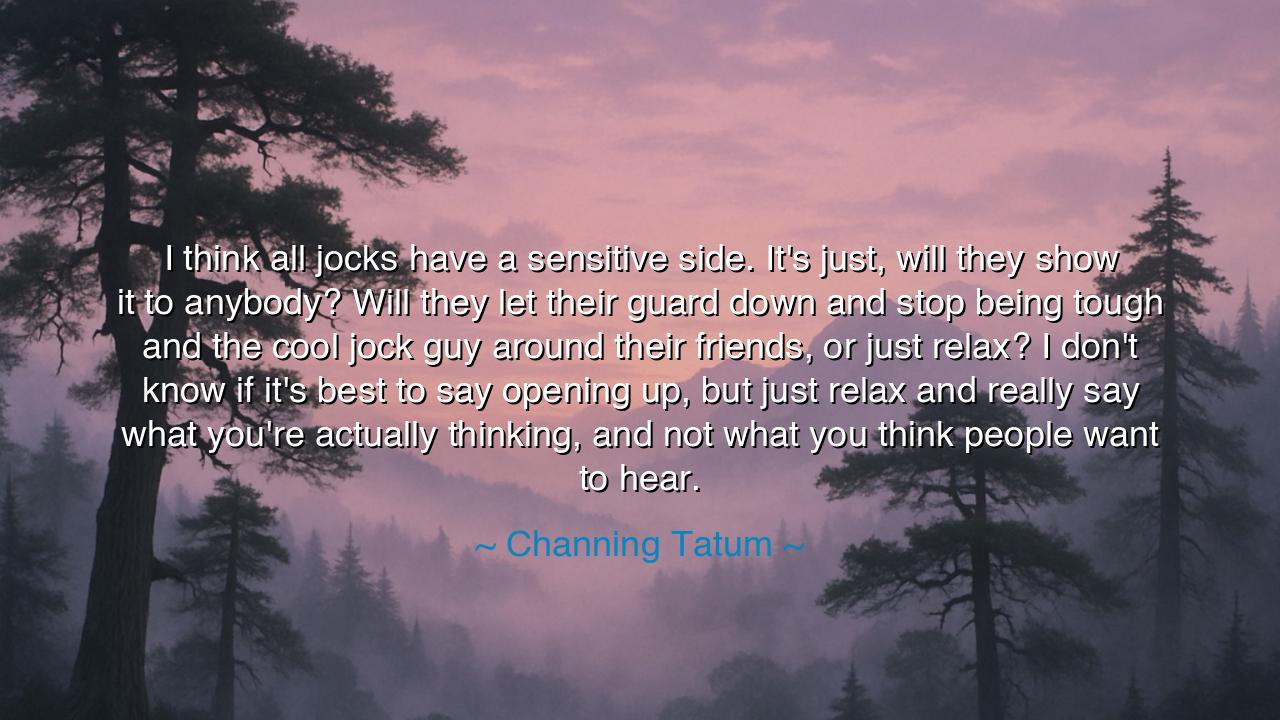
I think all jocks have a sensitive side. It's just, will they
I think all jocks have a sensitive side. It's just, will they show it to anybody? Will they let their guard down and stop being tough and the cool jock guy around their friends, or just relax? I don't know if it's best to say opening up, but just relax and really say what you're actually thinking, and not what you think people want to hear.






"I think all jocks have a sensitive side. It's just, will they show it to anybody? Will they let their guard down and stop being tough and the cool jock guy around their friends, or just relax? I don't know if it's best to say opening up, but just relax and really say what you're actually thinking, and not what you think people want to hear." These words by Channing Tatum speak to a universal truth about identity, vulnerability, and the societal pressures that shape how individuals, particularly men, express themselves. In Tatum's view, the "tough" exterior often displayed by athletes—what we call the "jock" persona"—is a defense mechanism. Beneath this hardened shell, there lies a sensitive side, one that is often concealed or repressed because of fear, societal expectations, or the desire to maintain a particular image. The question Tatum poses is whether individuals are willing to let their guard down, to show their true selves, and to communicate not what others expect, but what they genuinely feel.
In the ancient world, particularly within Greek and Roman cultures, the concept of manliness or virtue was often associated with strength, stoicism, and bravery. Homer’s Iliad presents heroes like Achilles and Hector, whose outward strength and courage on the battlefield were seen as ideals of masculinity. Yet, even in these revered warriors, we see moments of deep vulnerability and sensitivity. Achilles, in particular, experiences profound emotional turmoil over the loss of his dear friend Patroclus, showing that even the strongest men were not immune to grief. This balance between strength and sensitivity was recognized in the ancient world: to be truly virtuous was not merely about outward toughness, but about understanding and embracing one’s emotions—acknowledging the human condition in all its complexity.
Similarly, the Romans revered the concept of virtus, which encompassed bravery and strength, but also wisdom and the ability to show restraint and self-control. The great general Julius Caesar, for example, was not only a warrior but a statesman who understood the value of emotional intelligence and strategy. Caesar was able to navigate the complex political landscape of Rome not only with military might but with a sharp understanding of human nature—recognizing that real power often lies in empathy and connection. In this way, Tatum’s quote resonates with the Roman ideal that true strength is not merely about outward display but about embracing the full range of human emotions and being willing to express vulnerability when needed.
Tatum’s statement also touches upon the idea of emotional authenticity—an ideal that has become more recognized in recent years. Modern society, particularly for men, often encourages the suppression of emotions in favor of a more stoic, controlled exterior. This expectation can lead to a disconnect between one’s true self and the persona they project to the world. Historical figures like Abraham Lincoln provide a powerful example of emotional openness. Lincoln, often regarded as one of the greatest American presidents, was known for his deep empathy and willingness to express sorrow in both his personal and professional life. His ability to open up about his struggles, including the death of his son, helped him connect with the American people during a period of deep division. Lincoln’s vulnerability did not make him weak; rather, it made him more relatable and resilient, qualities that strengthened his leadership.
The lesson from Tatum’s quote, and from these historical figures, is clear: vulnerability is not a weakness, but a strength. The ancient Greeks and Romans understood that true virtue lies in the balance of strength and emotion, courage and sensitivity. In today’s world, the act of letting go of the "tough guy" persona and allowing oneself to express real feelings can be a powerful act of authenticity and courage. It takes strength to let go of societal expectations and to truly express what one is thinking and feeling, not what others want to hear.
In your own life, ask yourself: what parts of yourself do you hide in order to appear strong or cool? Are there areas of your life where you feel the need to put on a facade in order to fit in or to meet the expectations of others? The true power comes when we release the facade, when we allow ourselves to show up authentically in every area of life. Whether in personal relationships, work, or social settings, embracing vulnerability—acknowledging our emotions, our uncertainties, and our fears—makes us stronger, not weaker. Like the ancient heroes, who were not only known for their strength but also for their humanity, we too can learn to lead with both courage and authenticity.
Remember that true coolness does not come from suppressing who you are, but from embracing and expressing your full self. Strength is not about building walls to hide behind but about breaking those walls down and allowing others to see the real you. Embrace your sensitive side, share your true thoughts, and allow yourself to be vulnerable, for in that vulnerability lies the greatest strength. When we stop hiding our true selves behind masks and labels, we find that we are not only more connected to others but also to our own deepest power.






AAdministratorAdministrator
Welcome, honored guests. Please leave a comment, we will respond soon